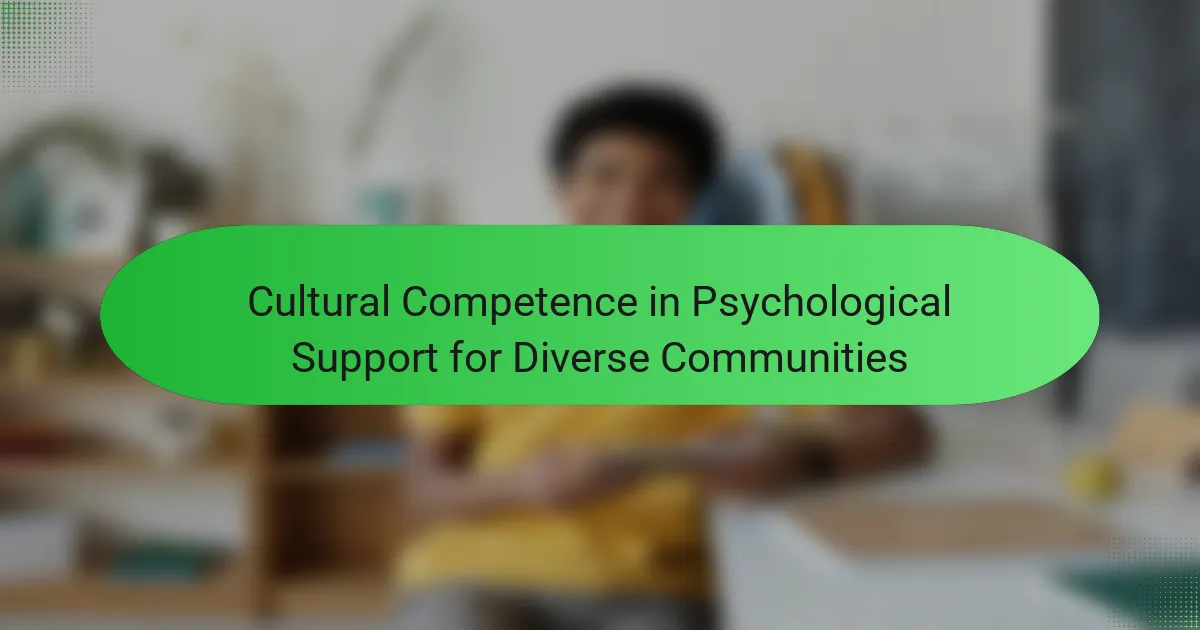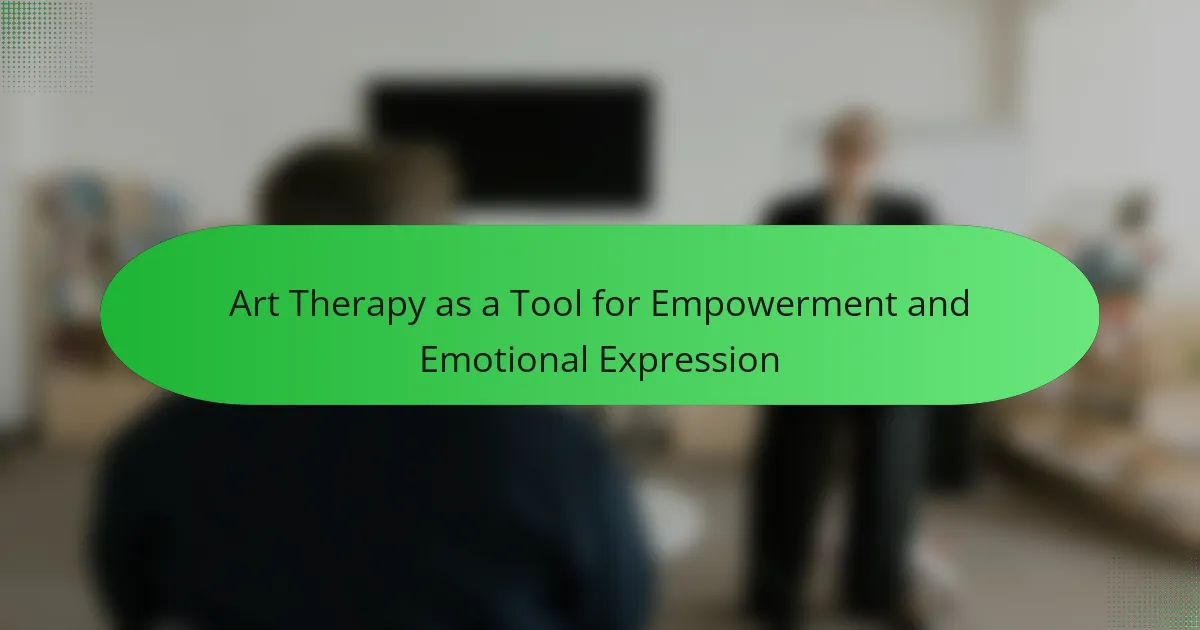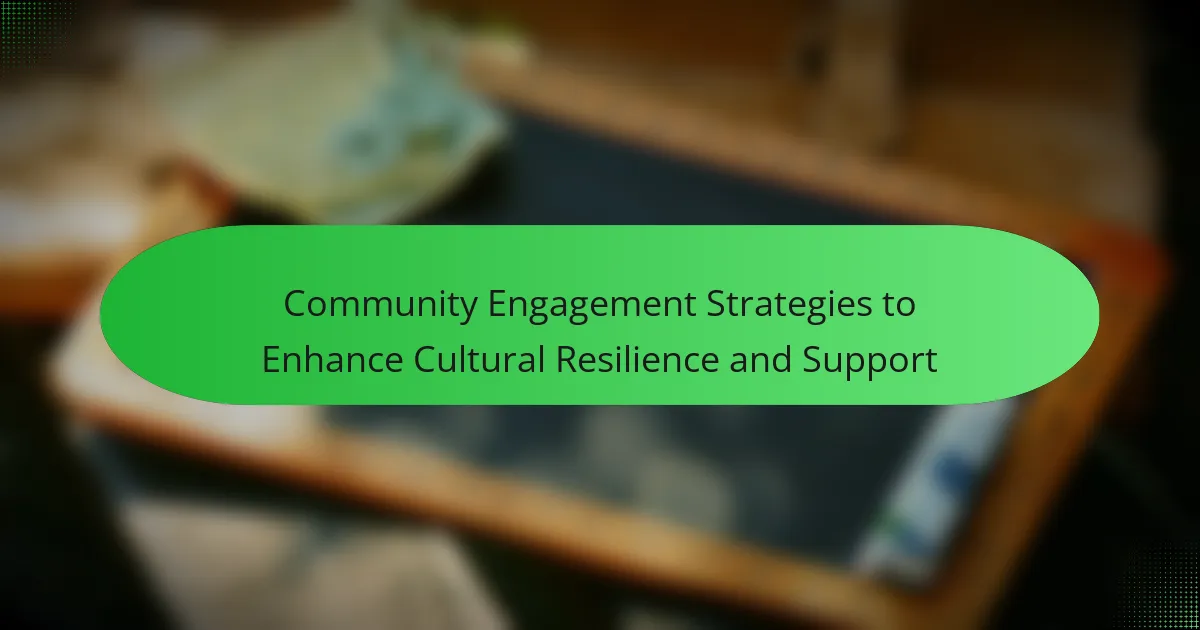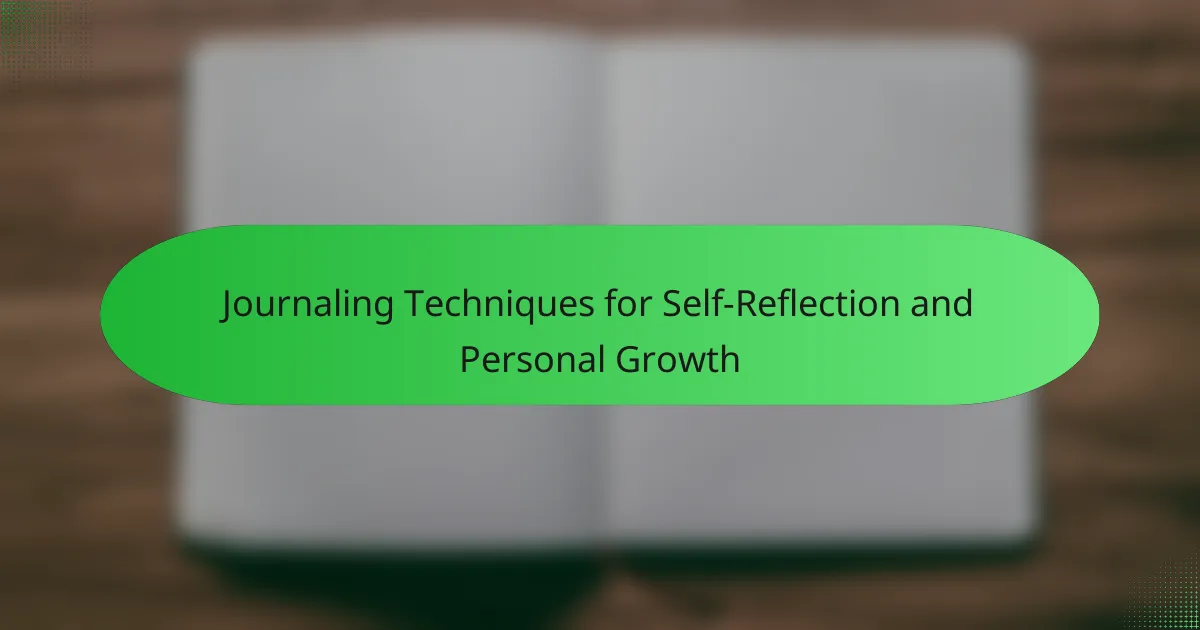Psychological self-help techniques empower individuals to achieve personal growth and overcome challenges. Key methods include mindfulness for emotional regulation, cognitive restructuring to reshape negative beliefs, structured goal setting for clear objectives, and positive affirmations to boost self-worth. Additionally, self-reflection techniques enhance self-awareness, while motivational strategies like visualization and accountability further support personal development. Addressing barriers to implementation and exploring rare techniques can deepen the effectiveness of these practices.
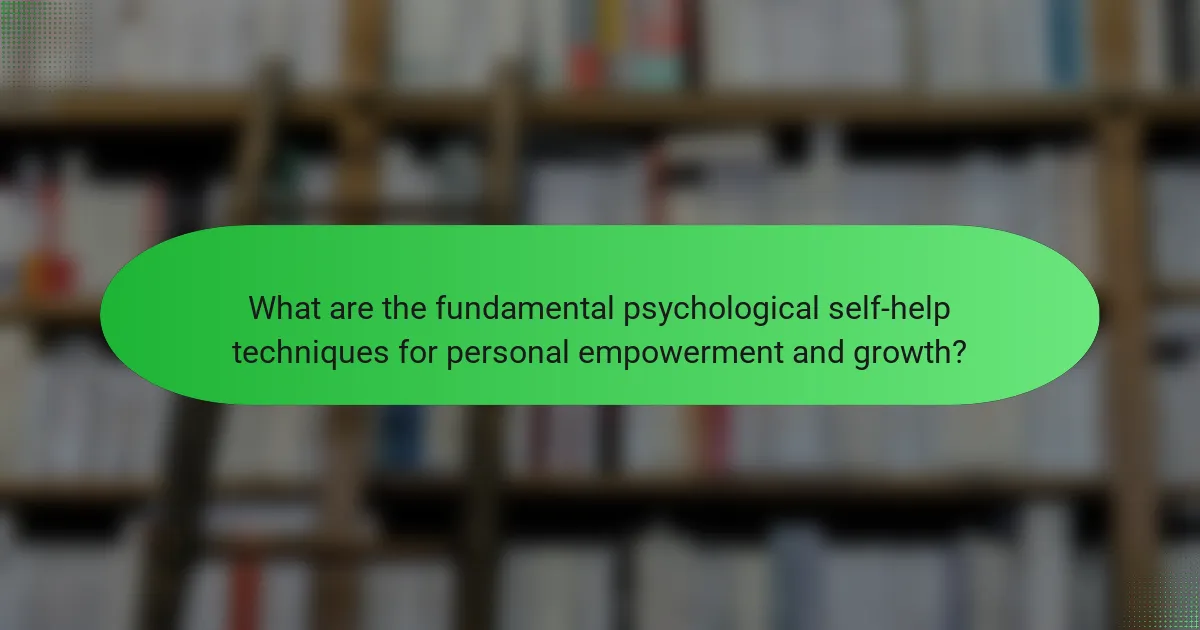
What are the fundamental psychological self-help techniques for personal empowerment and growth?
Psychological self-help techniques for personal empowerment and growth include mindfulness, cognitive restructuring, goal setting, and positive affirmations. These methods enhance self-awareness, reshape negative thought patterns, clarify objectives, and foster a positive self-image.
Mindfulness encourages present-moment awareness, reducing stress and enhancing emotional regulation. Cognitive restructuring helps identify and alter negative beliefs, promoting healthier thinking. Goal setting provides a structured approach to achieving personal aspirations, while positive affirmations reinforce self-worth and motivation.
Incorporating these techniques consistently can lead to significant personal development and empowerment. For example, practicing mindfulness daily can improve focus and resilience, contributing to overall well-being.
How do cognitive behavioral techniques contribute to self-improvement?
Cognitive behavioral techniques significantly enhance self-improvement by promoting positive thought patterns and behaviors. These techniques help individuals identify and challenge negative beliefs, leading to improved emotional regulation and decision-making.
By employing strategies such as cognitive restructuring, individuals can replace irrational thoughts with rational ones, fostering a growth mindset. This transformation often results in increased self-esteem and motivation, empowering individuals to pursue personal goals effectively.
Additionally, techniques like exposure therapy encourage facing fears gradually, which builds resilience and confidence. Overall, cognitive behavioral techniques serve as a practical framework for personal empowerment and sustained growth.
Which mindfulness practices enhance emotional resilience?
Mindfulness practices that enhance emotional resilience include meditation, deep breathing, and body scans. These techniques promote self-awareness and emotional regulation. Regular meditation can decrease anxiety by 30%, while deep breathing exercises lower stress hormones. Body scans help identify and release tension, fostering a sense of calm. Incorporating these practices into daily routines strengthens coping mechanisms and increases overall emotional well-being.
What role does goal setting play in personal development?
Goal setting is essential for personal development as it provides direction and motivation. It helps individuals clarify their aspirations and create actionable plans. Setting specific, measurable goals enhances focus and accountability, leading to improved self-discipline. Research indicates that people who set goals are more likely to achieve significant personal growth and empowerment. Additionally, goal setting fosters a sense of accomplishment, boosting self-esteem and encouraging further progress.

How can self-reflection techniques lead to personal insights?
Self-reflection techniques can lead to personal insights by fostering deeper self-awareness and understanding. These techniques, such as journaling and meditation, encourage individuals to evaluate their thoughts, emotions, and behaviors. As a result, they can identify patterns and make informed decisions that promote personal growth. Engaging in regular self-reflection can enhance emotional intelligence and resilience, allowing for better coping strategies in challenging situations. Ultimately, this process empowers individuals to align their actions with their values and goals, leading to a more fulfilling life.
What methods facilitate effective self-assessment?
Effective self-assessment can be facilitated through structured reflection, goal-setting, and feedback mechanisms. These methods empower individuals to identify strengths and areas for improvement.
1. Structured Reflection: Regularly dedicate time to reflect on experiences and emotions. This helps in recognizing patterns and personal growth.
2. Goal-Setting: Establish clear, achievable objectives. This provides direction and a benchmark for measuring progress.
3. Feedback Mechanisms: Seek constructive feedback from peers or mentors. External perspectives can illuminate blind spots and enhance self-awareness.
4. Journaling: Maintain a personal journal to document thoughts, feelings, and experiences. This practice fosters deeper insights and accountability.
5. Mindfulness Practices: Engage in mindfulness or meditation to enhance self-awareness and emotional regulation. This can lead to clearer self-assessment.
How does journaling support emotional processing?
Journaling significantly enhances emotional processing by providing a structured outlet for thoughts and feelings. This technique encourages self-reflection, helping individuals identify and understand their emotions.
Writing about experiences can lead to increased emotional clarity, allowing individuals to articulate feelings that may otherwise remain unexpressed. Studies indicate that expressive writing can reduce stress and improve mental well-being, reinforcing personal empowerment and growth.
Additionally, journaling facilitates problem-solving by enabling individuals to explore different perspectives on their challenges. This process often reveals patterns in thoughts and behaviors, contributing to personal insight and emotional resilience.
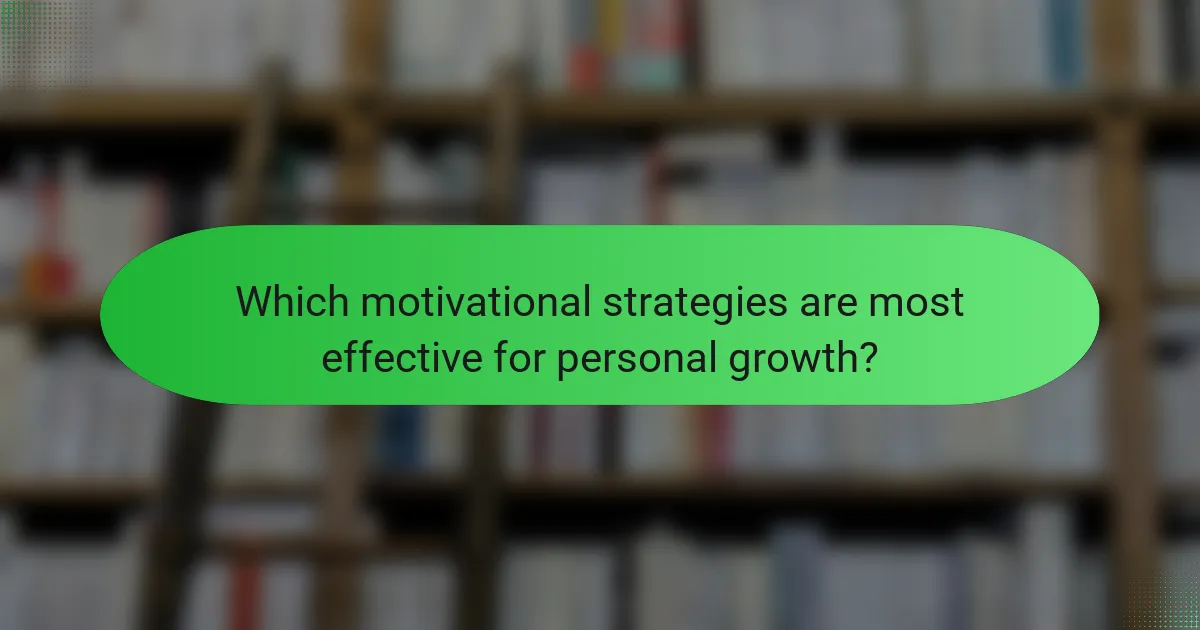
Which motivational strategies are most effective for personal growth?
Effective motivational strategies for personal growth include goal setting, positive self-talk, visualization, and accountability. These techniques empower individuals to overcome obstacles and enhance self-efficacy.
Goal setting involves defining clear, measurable objectives, which provide direction and motivation. Positive self-talk encourages a constructive mindset, fostering resilience and confidence. Visualization techniques help individuals imagine success, reinforcing motivation and focus. Accountability, whether through peer support or self-monitoring, enhances commitment to personal growth.
Incorporating these strategies can lead to significant improvements in personal development and overall well-being.
How can visualization techniques boost confidence?
Visualization techniques can significantly boost confidence by enhancing self-perception and focus. They allow individuals to mentally rehearse success, which can lead to improved performance in real-life situations. Techniques such as guided imagery and visualization exercises help create a positive mental environment. As a result, individuals often experience reduced anxiety and increased motivation. Research indicates that athletes and public speakers frequently use visualization to enhance their confidence and achieve their goals.
What impact does positive self-talk have on mental health?
Positive self-talk significantly enhances mental health by improving self-esteem and reducing anxiety. This technique fosters a positive mindset, leading to better emotional regulation and resilience. Research shows that individuals practicing positive self-talk experience lower levels of stress and increased motivation. By reshaping negative thought patterns, this approach empowers personal growth and enhances overall well-being.
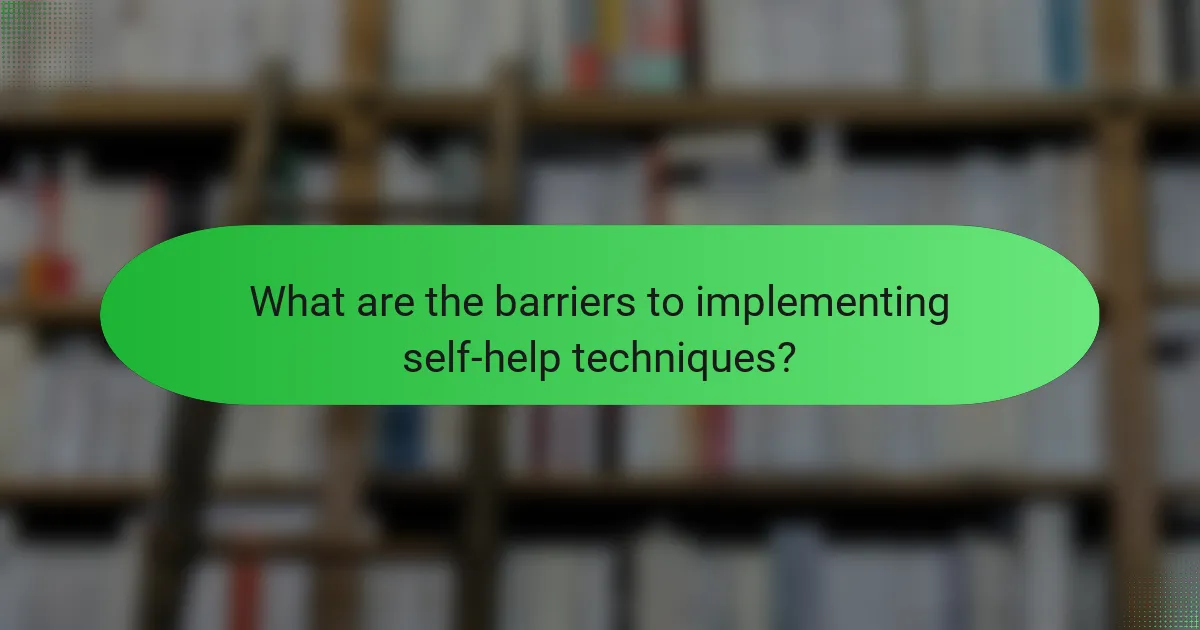
What are the barriers to implementing self-help techniques?
Barriers to implementing self-help techniques include lack of motivation, insufficient knowledge, and external distractions. Many individuals struggle to prioritize self-help practices due to their busy lifestyles. Additionally, misinformation can lead to ineffective techniques being pursued. Emotional resistance, such as fear of change, also hinders progress.
How do cultural perceptions influence the adoption of self-help practices?
Cultural perceptions significantly shape the adoption of self-help practices by influencing beliefs and attitudes. Societal norms dictate what is deemed acceptable or beneficial in personal development. For example, in collectivist cultures, community-oriented practices may be favored over individualistic approaches. This preference can affect the popularity of specific self-help techniques, such as mindfulness or cognitive behavioral therapy. Additionally, the stigma surrounding mental health in certain cultures can hinder the acceptance of self-help strategies. Understanding these cultural nuances is essential for effective implementation of psychological self-help techniques.
What common misconceptions hinder personal empowerment?
Common misconceptions that hinder personal empowerment include the belief that change is impossible, that success is solely based on talent, and that vulnerability is a weakness. These misconceptions create mental barriers that prevent individuals from taking proactive steps toward growth. For instance, the idea that one must be naturally gifted can discourage effort and persistence, while viewing vulnerability negatively can inhibit authentic connections and support. Recognizing and challenging these beliefs is essential for fostering a mindset conducive to personal empowerment.
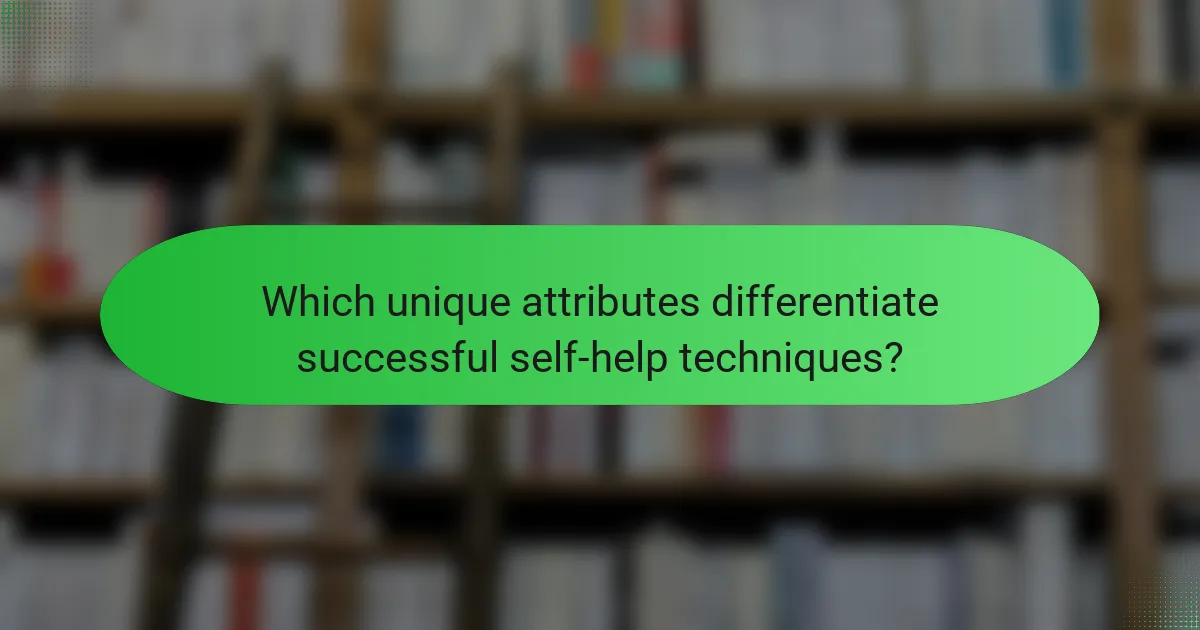
Which unique attributes differentiate successful self-help techniques?
Successful self-help techniques are differentiated by their unique attributes, such as personalization, evidence-based practices, and adaptability. Personalization tailors approaches to individual needs, enhancing engagement and effectiveness. Evidence-based practices ensure techniques are grounded in scientific research, increasing credibility. Adaptability allows techniques to evolve with personal growth and changing circumstances. These attributes contribute to sustained personal empowerment and growth.
How do individual learning styles affect the effectiveness of self-help methods?
Individual learning styles significantly influence the effectiveness of self-help methods. Tailoring techniques to fit these styles enhances personal empowerment and growth. For example, visual learners benefit from diagrams and videos, while auditory learners thrive with podcasts and discussions. Kinesthetic learners prefer hands-on activities and experiential learning. Understanding these preferences allows individuals to select strategies that resonate, leading to better engagement and outcomes. Ultimately, aligning self-help methods with learning styles fosters a more impactful personal development journey.
What is the significance of community support in personal growth journeys?
Community support is crucial for personal growth journeys as it fosters connection, encouragement, and accountability. Engaging with supportive individuals enhances motivation and resilience, making it easier to overcome challenges. Studies show that social support can significantly reduce stress and improve mental well-being, leading to more effective self-help techniques. Additionally, shared experiences within a community can provide unique insights and perspectives, enriching personal empowerment and growth.
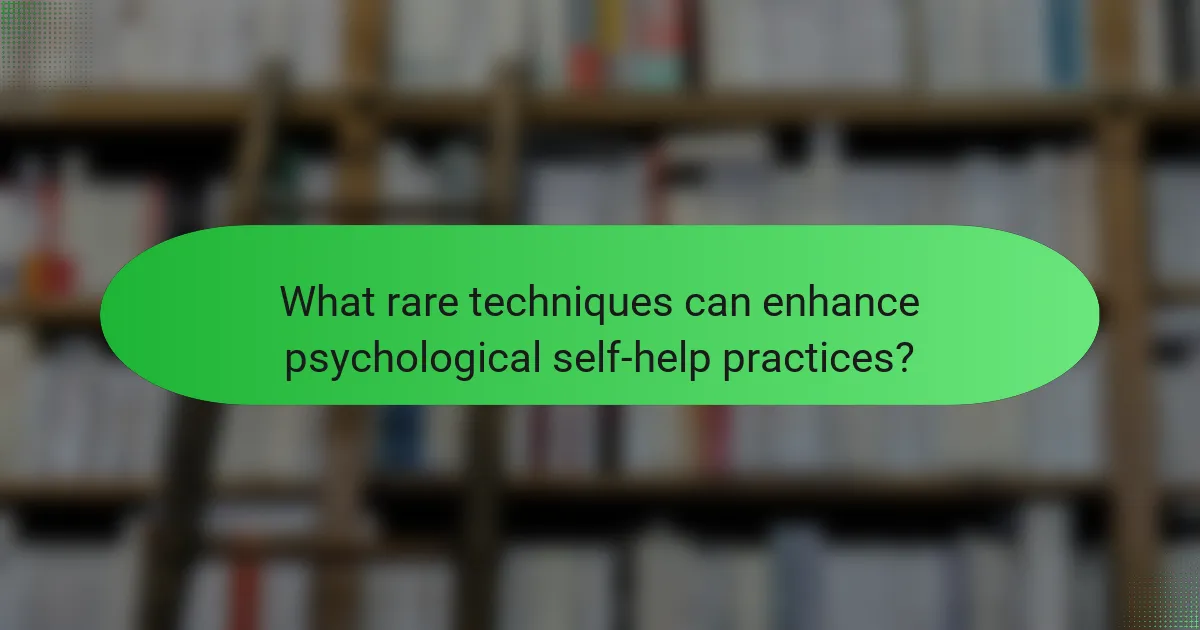
What rare techniques can enhance psychological self-help practices?
Rare techniques that can enhance psychological self-help practices include mindfulness-based art therapy, somatic experiencing, and narrative therapy. These approaches promote personal empowerment by fostering self-awareness and emotional regulation. Mindfulness-based art therapy combines creative expression with mindfulness, encouraging individuals to explore their feelings through art. Somatic experiencing focuses on bodily sensations to release trauma, enhancing emotional well-being. Narrative therapy helps individuals reshape their personal stories, empowering them to view their experiences from a new perspective. Each technique offers unique benefits that can significantly enhance self-help practices.
How does art therapy provide unique pathways to self-discovery?
Art therapy provides unique pathways to self-discovery by facilitating personal expression and emotional exploration. Through creative processes, individuals can access subconscious thoughts and feelings, leading to insights about their identity and experiences. This form of therapy promotes self-reflection, helping clients recognize patterns in their behavior and emotions. As a result, participants often experience increased self-awareness and empowerment. Art therapy can also serve as a non-verbal outlet, making it especially beneficial for those who struggle to articulate their thoughts verbally.
What role does nature immersion play in psychological well-being?
Nature immersion significantly enhances psychological well-being by reducing stress and improving mood. Engaging with natural environments fosters a sense of connection and tranquility. Studies indicate that spending time in nature can lower cortisol levels, leading to decreased anxiety. Additionally, exposure to green spaces is linked to improved cognitive function and emotional resilience. One unique aspect is the concept of “forest bathing,” which emphasizes the mental health benefits of simply being present in nature. This practice promotes mindfulness and can lead to lasting improvements in overall mental health.
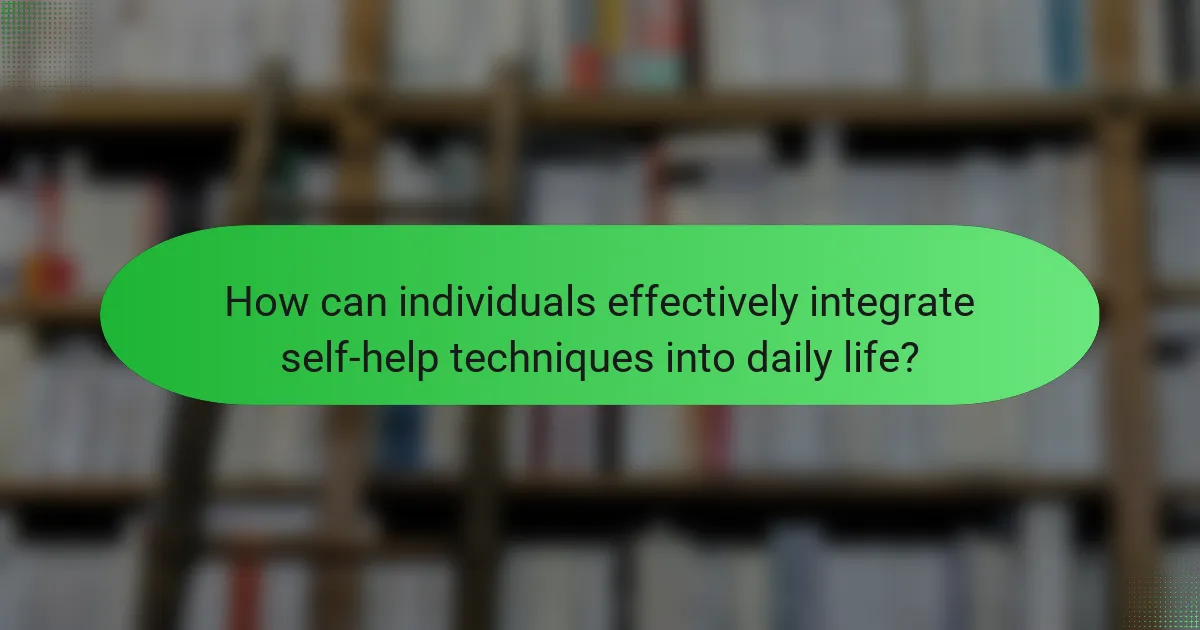
How can individuals effectively integrate self-help techniques into daily life?
Individuals can effectively integrate self-help techniques into daily life by practicing mindfulness, setting clear goals, and maintaining a positive mindset. Mindfulness enhances self-awareness, allowing individuals to identify emotional triggers and manage stress. Setting SMART goals—specific, measurable, achievable, relevant, and time-bound—provides a clear path for personal growth. A positive mindset fosters resilience, enabling individuals to overcome challenges and embrace change. Regular reflection on progress reinforces motivation and commitment to self-improvement.
What are the best practices for sustaining motivation in personal development?
To sustain motivation in personal development, establish clear goals, track progress, and celebrate small achievements. Create a supportive environment and practice self-compassion. Engage in regular reflection to adjust your approach as needed. Surround yourself with inspiring individuals to maintain enthusiasm.
Which common mistakes should be avoided when practicing self-help techniques?
To maximize the effectiveness of psychological self-help techniques, avoid these common mistakes.
1. Neglecting self-reflection: Failing to assess personal progress can hinder growth.
2. Overlooking individual needs: Using a one-size-fits-all approach may not address unique challenges.
3. Setting unrealistic goals: Aiming too high can lead to frustration instead of empowerment.
4. Ignoring professional help: Relying solely on self-help without professional guidance can limit effectiveness.
5. Skipping consistency: Inconsistent practice reduces the long-term benefits of self-help techniques.
6. Disregarding emotional responses: Ignoring feelings during self-help can impede personal development.
How can accountability partners enhance the effectiveness of self-help strategies?
Accountability partners significantly enhance self-help strategies by providing support, motivation, and feedback. They help individuals stay committed to their goals, fostering a sense of responsibility. This partnership encourages open communication, which can lead to deeper insights and personal growth. As a result, individuals often experience improved outcomes in their self-help endeavors.
